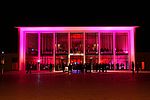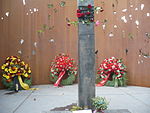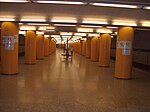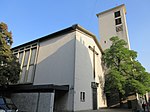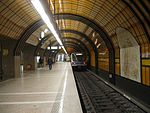Olympia Looping

Olympia Looping, also known as Munich Looping, is a portable steel roller coaster owned and operated by R. Barth und Sohn Schaustellerbetriebe KG. The ride was designed by Anton Schwarzkopf and Werner Stengel, and built by BHS. It is the largest portable roller coaster in the world, and the only one with five inversions. It appears at many carnivals in Germany, most notably Oktoberfest, where it made its debut in 1989. It is named for its five vertical loops, which resemble the Olympic rings. Although they are clothoid-shaped, their shape is closer to circular than the ones on most other roller coasters, so they exert unusually high g-forces on the passengers (up to 5.2 g). The entire structure weighs 900 tons and requires a space 85 m wide by 36 m deep. The ride usually runs with five cars per train, though at events such as Oktoberfest and Winter Wonderland in Hyde Park, London, it runs with seven to increase throughput in busy periods.
Excerpt from the Wikipedia article Olympia Looping (License: CC BY-SA 3.0, Authors, Images).Olympia Looping
Hans-Fischer-Straße, Munich St. Paul (Ludwigsvorstadt-Isarvorstadt)
Geographical coordinates (GPS) Address Website Nearby Places Show on map
Geographical coordinates (GPS)
| Latitude | Longitude |
|---|---|
| N 48.131 ° | E 11.549 ° |
Address
Theresienwiese (Oktoberfest)
Hans-Fischer-Straße
80336 Munich, St. Paul (Ludwigsvorstadt-Isarvorstadt)
Bavaria, Germany
Open on Google Maps





